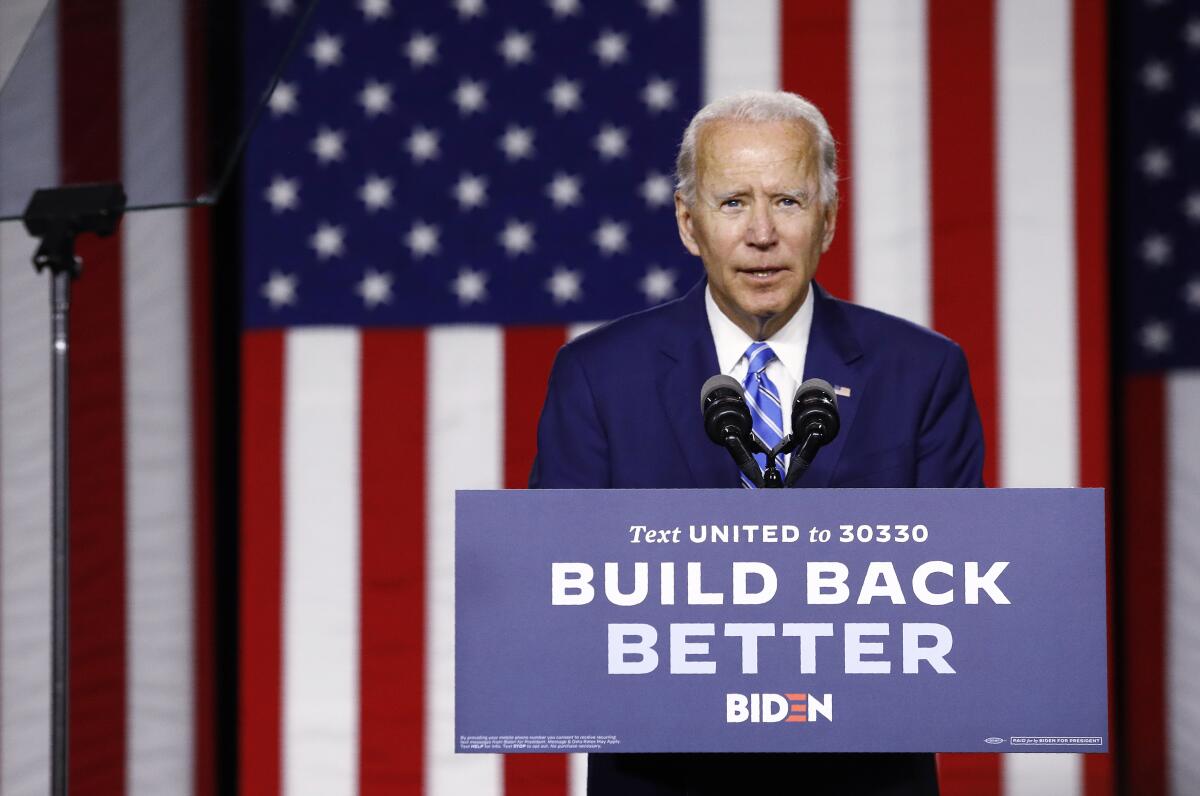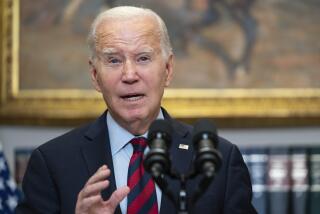Biden calls for overhauling the nation’s caregiving system to boost the economy

- Share via
Joe Biden proposed on Tuesday a $775-billion overhaul of the nation’s caregiving system, efforts that he argued will create 3 million jobs while freeing up millions of people — largely women and people of color — to enter the workforce.
The presumptive Democratic presidential nominee’s plan includes measures to expand care for children, older people and disabled people. Some of the boldest proposals — such as providing free universal preschool for all 3- and 4-year-olds and creating tax credits to help pay for child care — come as the needs of parents struggling to balance caring for their children while working have been thrown into sharp relief by the COVID-19 pandemic and as many schools are opting against in-person instruction in the fall.
“This is about easing the squeeze on working families who are raising their kids and caring for aging loved ones at the same time,” Biden said, speaking at the Colonial Early Education Program at Colwyck Center in New Castle, Del. “It’s about creating jobs with better pay and career pathways for caregivers, and showing them the dignity and respect that they deserve.”
Parents, teachers see ‘slate of bad options’ as coronavirus risk hovers over classroom learning
The caregiving proposal is the third plank of Biden’s four-part “Build Back Better” plan to rebuild the United States’ economy, which has been ravaged by the coronavirus outbreak and the subsequent displacement of millions of American workers.
This month, Biden unveiled a $700-billion proposal to reinvigorate the nation’s manufacturing sector and a $2-trillion effort to build new renewable energy infrastructure. The final piece of his plan, expected in coming weeks, will seek to address racial inequity in the nation’s economy in areas such as housing, education and entrepreneurship opportunities.
Biden would pay for ongoing costs in the overall package in part by rolling back some of President Trump’s tax cuts for corporations and by raising taxes on the wealthy. The cost of the expanded caregiving — $775 billion over a decade — would be paid by rolling back tax loopholes on real estate investors with incomes over $400,000 and making the wealthy pay all the taxes they owe, according to the campaign. A senior Biden campaign advisor said the efforts to make sure the wealthy comply with tax laws alone could raise “hundreds of billions of dollars.”
The former vice president is laying out these proposals as voters’ attitudes about who would be a better steward of the economy are shifting. Though Biden has had a sustained lead in national polling and an advantage in battleground state surveys, Trump held an edge in voters’ trust of his handling of the economy.
But with millions of laid-off Americans seeking government assistance and businesses struggling to remain open during the pandemic, that advantage has evaporated into an effective tie. A Fox News poll released Sunday found voters trusted Biden to do a better job on the economy, 44% to 43%. In an ABC News/Washington Post poll released Saturday, voters favored Trump 47% to 45%.
Even before the coronavirus outbreak pushed the U.S. into what is likely a recession, benefits from Trump’s policies were largely offset by costs.
Women, most often tasked with the care of children and aging parents, are among the key voting blocs in the November election.
Though Biden eschewed some of the most liberal Democratic policies during the primaries, such as “Medicare for All” and tuition-free college for all, the Trump campaign is trying to paint him as a figurehead who will channel the party’s most liberal voices on issues including the economy.
The president’s campaign said Tuesday that Biden’s economic plans will cost trillions of taxpayer dollars while crushing job creation.
“Instead of pro-job and pro-growth policies, Biden is turning to an old friend — tax hikes and big government,” the campaign said in a statement.
Biden in his speech lashed out at the president’s handling of the coronavirus pandemic, saying Trump’s lack of leadership has made the crisis exponentially worse. He called on the president to move immediately to provide resources and equipment to child-care centers across the country that have had to close and layoff staff.
He argued that child- and elder-care shortfalls that existed before the pandemic have been exacerbated by the crisis that forced “the sandwich generation” to work from home, face reduced hours or lose their jobs, while figuring out how to care for dependents.
“Even before the pandemic, millions of working families were faced with enormous financial and personal strains trying to raise their kids and care for their parents or loved ones who live with disabilities,” Biden said.
He reflected on his time as a single father caring for his sons after his first wife and daughter were killed in a car crash, on his parents going into hospice care at his home, and his son Beau’s death from cancer.
“The joy and love are always there. But it’s hard. I know it’s hard. It’s really, really hard. Families are squeezed emotionally and financially. They need help.”
In addition to creating free universal preschool, Biden called for offering low- and middle-income families up to $8,000 in tax credits to help pay for child care and having the federal government partially subsidize the cost of child care for some low-income and middle-class families. He wants to create a new tax credit to nudge businesses to build day-care centers on site, and expand access to supervision programs during non-school hours.
Biden’s plan also increases pay and benefits for early-childhood instructors to make them commensurate with those of elementary school teachers, and encourages collective bargaining and unionization.
Biden’s plan adds 150,000 community healthcare workers in the nation’s neediest communities and creates a Public Health Jobs Corps of 100,000 more. Some 35,000 workers would be trained to target the opioid crisis and drug abuse.
Biden also pledged to eliminate the Medicaid waiting list of 800,000 people needing home healthcare or community services, and would fund state efforts that look at alternatives to institutionalization.
More to Read
Get the L.A. Times Politics newsletter
Deeply reported insights into legislation, politics and policy from Sacramento, Washington and beyond. In your inbox three times per week.
You may occasionally receive promotional content from the Los Angeles Times.













